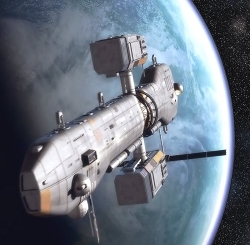-
-
So what exactly is this, anyway?
Like the rest of my website, Fleet Operations is
about my avocations.
I'm a naval analyst and wargame designer by
profession. Along the way, I've learned an awful
lot about how militaries -- and especially navies
-- operate. My hobbies consist taking that
information and applying it to fictional
settings, primarily science fictional. In my off
hours, I'm a naval analyst who analyzes navies
that don't really exist. Moreover, I spend a lot
of time thinking about the implications of
technology. Fleet Operations is a special conduit
whereby some of those disparate thoughts move
from my head to yours.
In its own way, Fleet Ops is my counterpart to
Winchell Chung's excellent
ATOMIC ROCKETS webpage.
-
Is Fleet Ops a blog? A wiki?
Yes. And no.
Blogs are characterized by information presented
in chronological fashion, with some degree of
permanence. This is different -- the
chronological piece is only there to let you know
what might be new, and that includes things that
have been rewritten. Thus, Fleet Ops doesn't look
like a traditional blog. It's probably closer to
a wiki, and I may shift it over to wiki software
at some point.
-
What do you mean "rewritten"?
I mean that posts are considered to be works in
progress, and will be expanded, corrected,
modified, and generally improved as circumstances
warrant. Posts that get too long, and acquire
some degree of permanence, may be added to the
Essays page on my main site, with a link here
pointing there. (The Permalink will remain
useful, if not the ultimate destination.)
-
-
What are the ground rules?
The ground rules are that you read and understand
the following. (Mostly I'm trying to pre-empt a
few emails.)
First, I understand that fiction is fictional and
not simply the 20th century with the serial
numbers filed off. My goal is not, for example,
to argue Gene Roddenberry is wrong because
Starfleet doesn't look like the U.S. Navy; my
goal is to highlight the similarities and
differences between the two so that people
don't think that Starfleet does
look like the U.S. Navy. And in the process of
doing so, I expect to highlight a few issues that
might crop up in a science fictional setting.
Second, just so that you know, the military is
not my only interest, and military SF is not my
only SF interest. In fact, if you use the
operational definition of military SF as being
"it's milSF if you can tell how much ammo has
been expended," I generally don't read milSF.
Third, when I mention a book or TV show or movie,
it generally means that the work in question does
either a really good job of exploring some facet
of the topic under discussion, or it handles it
particularly poorly. And even if it gets one
thing right it might get other stuff wrong. Some
of my best examples of getting something wrong
come from my favorite shows; other works I do not
mention may be works I consider excellent.
Fourth, I'm not real interested in fanboy
discussions about whether the Enterprise
could beat the Executor, or whether
Honor Harrington is tougher than Susan Ivanova,
or anything else of that ilk.
These ground rules may change over time. Assume
they apply to any of my contributors as well.
-
What happens if I ignore the ground rules?
I'll tell you to read them. If you refuse, I'll
stop answering your emails.
-
-
Christopher Weuve: Naval analyst, wargame
designer, Macintosh zealot, book evangelist, and
science fiction geek.
Chris is a wargame designer and naval analyst.
After six years at the Center for Naval Analyses
as a wargame designer and naval exercise analyst,
he joined the research faculty of the US Naval
War College in 2005, where he has focused on
using wargaming as a research tool. He moderates
several SF and wargaming mailing lists (inc.
SFConsim-L, NavWarGames and Exordium-L), and
spends his spare time pondering the differences
between fictional and Real-World(tm) naval forces
and combat. He is the moderator several science
fiction and wargaming mailing lists, including
the Science Fiction Wargames list (SFConsim-L),
the Naval Wargames List (NavWarGames) and the
Exordium mailing list (Exordium-L).He also claims
credit as the founder of the
Society for the Conservation of
Angular Momentum, although he admits
that was an accident. Chris has a Bachelors
in Political Science and History from the
University of Iowa, and a Masters in
National Security and Strategic Studies from
the US Naval War College. He has 87 days of
sea time on U.S. Navy warships, on four
aircraft carriers (four cat shots and four
traps), two destroyers, and two cruisers,
plus time spent in command spaces ashore.
-
And others...
...To be recruited.


